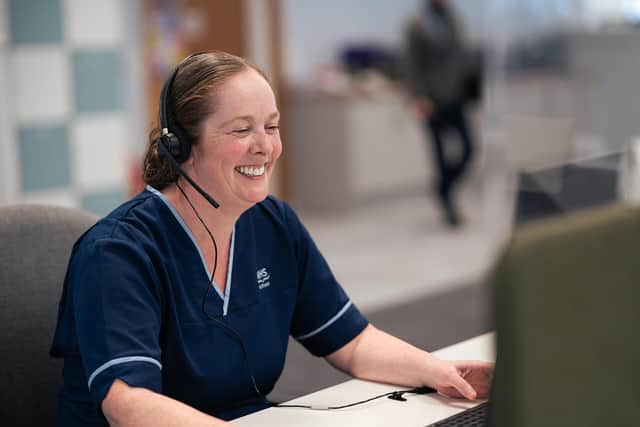Mental Health: Help is available for Scots suffering over Christmas, thanks to NHS Scotland
People are more susceptible to feelings of loneliness and low mood over the Christmas period, an NHS Scotland mental health professional has warned, as he urged Scots to remember the NHS’s phone line and digital teams are there for them during difficult times.
David McKissock, a mental health practitioner at NHS 24 - Scotland’s telephone and digital health provider - said patients can feel more isolated because their usual support structures, such as GPs and community pain management (CPM) teams, aren’t available.
Advertisement
Hide AdAdvertisement
Hide AdTo help people cope, NHS Scotland recently developed two digital resources for mental health - Mind to Mind and Surviving Suicidal Thoughts, both of which are available through the NHS Inform website or through search engines.


“Both of these projects come from a kind of service user experience,” said Mr McKissock, “and how they manage their own feelings.
“That’s important because quite often when we’re signposting people to similar resources, it’s a professional telling them what to do and what not to do, from a more academic point of view.
“However, these tools provide people’s advice and guidance from lived experiences, and I think it’s really beneficial for patients to actually hear something from someone in their own shoes, leaving an anecdotal account of how they’ve coped with similar situations.”
NHS Scotland’s Mind to Mind resources offer self-help guides for people feeling anxious, stressed, low, or having problems sleeping or dealing with grief.
Each section on different mental health problems features videos and anecdotes from professionals and patients with experience of treating or coping with their issues, as well as providing simple steps people can take to improve their mental health.
Meanwhile, the Surviving Suicidal Thoughts digital resource provides six anecdotal experiences of people who have gone through suicidal thoughts, ideation and bereavement, and how they recovered.
A middle-aged man named Neil shares how long it took him to discover he had depression because he mainly had physical symptoms and felt he had no reason to be depressed, while a woman called Kirsty describes how, “despite having a good upbringing and supportive family”, felt lonely and anxious as a child. She felt distressed but didn’t understand what was happening to her, and her story reflects on “the importance of listening to your body”.
Advertisement
Hide AdAdvertisement
Hide AdMr McKissock’s mental health team can also be accessed via NHS24, by calling 111 and selecting the mental health option.
The process is streamlined, and easy to navigate, explained Mr McKissock: “You would speak with one of our psychological well being practitioners, who would carry out an assessment and look to de-escalate any stress or distress you are feeling.
“We’d then explore that risk, and look to essentially administer self care and signpost resources.
“We make sure that you’re supported in your phone as much as possible, but make you aware of other services like your GP, etc.
“Where needed, they can do referrals without the need to see a GP or CPM, and the usual stuff that the core service can do.
“We also can accept referrals from the core services.
“So say you had called the core service about a cold, etc., but during the course of the assessment they actually picked up that you have previously hurt yourself, or have thoughts of harming yourself, or perhaps have symptoms of being psychotic.
“The core service can then transfer you to ourselves, and again, you get that assessment, and we look to get you the best support possible.”
When a person phones 111 and chooses the mental health option, they are connected to the Mental Health Hub, and can speak to a Psychological Wellbeing Practitioner (PWP), like Mr McKissock. These are specially trained advisors who work in mental health and are supported by mental health nurses.
Advertisement
Hide AdAdvertisement
Hide AdPWPs can offer advice on coping with mental health symptoms, but can also recommend and connect people with other services if needed. PWPs can access a range of both NHS and charity organisations to find the right support for patients.
NHS Scotland has also been developing new pathways to the NHS24 mental health service with other emergency services, to take pressure from them.
“There's a collaboration we've been working on for just over a year with Police Scotland,” said Mr McKissock.
“Historically, if you end up calling the police saying I'm feeling suicidal, or because you’re concerned about a loved one in a way that presented a risk, then the police may be deployed to your home, and you might end up in a chaotic journey to A&E or a GP for support.
“Now, when you call the police control centre, and during their assessment they identity a mental health issue, they can transfer that to ourselves.
“Again, that assessment will indicate the support you need without the need to go elsewhere.”
Earlier in December, NHS Scotland launched a collaboration with the Scottish Ambulance Service.
“Like with Police Scotland, they will do the initial assessment,” said Mr McKissock, “if you are concerned about harming yourself, or concerned for the safety of a loved one, they will make sure you are fit and safe to be transferred to ourselves, rather than deploying an ambulance.”
Advertisement
Hide AdAdvertisement
Hide AdFinally, Mr McKissock gave his advice to anyone suffering from mental health problems during the Christmas period: “Reach out, talk to somebody, either their community mental health hub, their GP or CPM, or it could be friends or family - but don't suffer in silence.
“By all means use NHS Inform. Watch the visuals that are available to get them back in support. Realise you're not alone, but always, always reach out..
“As always, you can talk to many charity organisations - Samaritans and organisations like that - just don't suffer in silence. Reach out and talk to somebody.”
Comments
Want to join the conversation? Please or to comment on this article.